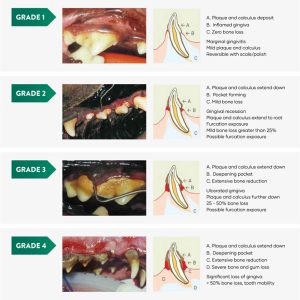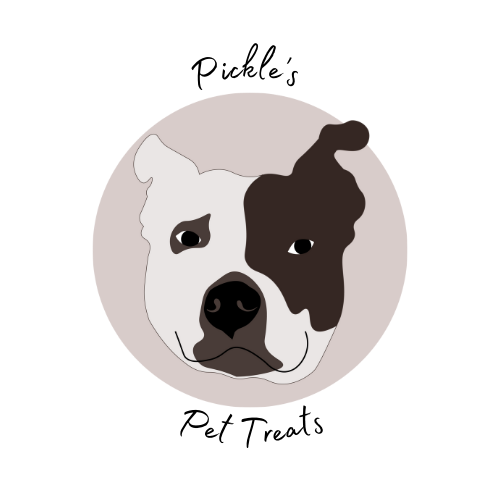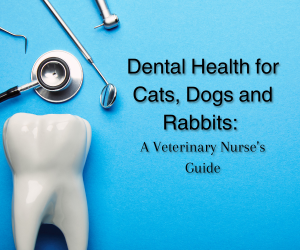As a veterinary nurse, I cannot stress enough the importance of dental health for our furry friends. Just like humans, cats and dogs can suffer from dental diseases that can affect their many other aspects of their health, causing further issues such as kidney disease. Rabbit’s teeth keep growing throughout their lives, and improper diet and husbandry is important to prevent overgrowth and improper wearing.
In this blog post, we’ll explore the grades of dental disease, preventative care, and veterinary care recommendations to keep your pets’ teeth in tip-top shape.
Grades of Dental Disease
Dental disease in pets is typically classified into four grades:
- Grade 1: Gingivitis
- Symptoms: Mild redness and inflammation of the gums, mildly bad breath and a small amount of tartar buildup – particularly on the premolars and canines.
- Treatment: Professional dental cleaning and improved home dental care, including the use of dental health products such as Prozym and Plaque-off andregular brushing.
- Grade 2: Early Periodontitis
- Symptoms: Increased redness and inflammation, increased plaque and tartar buildup, and increasingly bad breath.
- Treatment: Professional dental cleaning, scaling, and polishing. Home care is crucial to prevent progression.
- Grade 3: Moderate Periodontitis
- Symptoms: Severe inflammation, bad breath, bleeding gums, moderate tartar buildup, bone loss, and possible tooth mobility.
- Treatment: Professional dental cleaning with radiographs, possible tooth extractions, and rigorous home care.
- Grade 4: Advanced Periodontitis
- Symptoms: Severe inflammation, deep pockets around teeth, significant tartar buildup, bone loss, loose or missing teeth, and pain.
- Treatment: Extensive dental treatment with radiographs, including extractions, and intensive home care to manage the condition.
Preventative Care
Preventative care is the key to maintaining your pet’s dental health. Here are some tips to help prevent dental disease:
- Regular Brushing: Brushing your pet’s teeth daily using a pet-specific toothbrush and toothpaste such as Tropiclean or Dentipet is the best way to clean your pet’s teeth, which helps to remove plaque and prevent tartar buildup. You can even get flavours such as peanut butter and chicken to increase compliance and make the task more pleasurable for your cat or dog.
- Dental Chews and Toys: Provide dental chews and toys designed to reduce plaque and tartar. These can be a fun and effective way to keep your pet’s teeth clean. Try filling or spreading an enticing food on these toys to make your pet more likely to chew.
- Healthy Diet: Feed your pet a balanced diet that promotes dental health. Some pet foods are specifically formulated to reduce plaque and tartar such as Hills TD, Royal Canin Dental, or Vet One Dental for small dogs or cats.
- Dental Supplements: Water additives are a great way to look after your pet’s teeth with minimal effort, and a specific type of seaweed called Ascophyllum nodosum found in products such as Plaque-off and Simply Seaweed can be added to your pet’s food to help soften tartar buildup.
- Regular Check-ups: Schedule regular veterinary check-ups to monitor your pet’s dental health and catch any issues early.
Veterinary Care Recommendations
Even with the best preventative care, some pets may still develop dental issues. Here are some veterinary care recommendations:
- Professional Dental Cleanings: Regular professional dental cleanings are essential to remove plaque and tartar that cannot be addressed with home care alone. Your veterinarian will perform a thorough cleaning under anesthesia to ensure your pet’s comfort and safety.
- Dental X-rays: Dental X-rays can help identify underlying issues that are not visible during a routine examination. This allows for early detection and treatment of dental problems.
- Treatment of Dental Disease: If your pet is diagnosed with dental disease, your veterinarian will recommend the appropriate treatment, which may include scaling, polishing, extractions, or other procedures.
- Follow-up Care: After any dental procedure, follow your veterinarian’s recommendations for follow-up care and home dental care to maintain your pet’s oral health.
Dental Disease and Systemic Health
Dental disease doesn’t just affect your pet’s mouth; it can have serious implications for their overall health. One of the most concerning connections is between dental disease and renal (kidney) failure. Here’s how it happens:
- Bacterial Spread: When a pet has dental disease, bacteria from the mouth can enter the bloodstream and travel to other organs, including the kidneys.
- Inflammation and Infection: These bacteria can cause inflammation and infection in the kidneys, leading to damage to the kidneys over time.
- Chronic Kidney Disease: Chronic exposure to these bacteria can result in chronic kidney disease, a serious and progressive condition that can be fatal if left untreated.
In addition to kidney disease, dental disease can lead to several other systemic illnesses:
Heart Disease: Bacteria from dental disease can enter the bloodstream and settle on the heart valves, causing infections such as endocarditis.
Liver Disease: The liver can also be affected by bacteria from dental disease, leading to liver abscesses and other infections.
Sepsis: Severe dental disease can lead to sepsis, a life-threatening condition where the body’s response to infection causes widespread inflammation.
Diabetes Complications: Dental disease can make it more challenging to regulate diabetes in pets, as the inflammation and infection can affect blood sugar levels.
Bone Infections: Advanced dental disease can lead to osteomyelitis, an infection of the bone that can be painful and difficult to treat.
Rabbit Dental Care
Rabbits have unique dental needs due to their continuously growing teeth. Here are some important aspects of rabbit dental care:
Diet: Provide a diet high in fibrous foods such as grass and hay. A rabbit’s diet should be 70% hay. This helps wear down their teeth naturally and prevents overgrowth.
Chew Toys: Offer plenty of chew toys to naturally wear down your rabbit’s teeth and prevent overgrowth.
Regular Check-ups: Schedule regular veterinary check-ups to monitor your rabbit’s dental health. Early detection of dental issues is crucial for effective treatment. Rabbits may also have dental procedures done, which generally consists of burring the teeth down to a more natural size and shape. Rarely, rabbits may have congenital issues that cause their teeth to grow improperly, causing misalignment and inability to naturally wear down. These rabbits require regular burring of the teeth to correct these issues.
Signs of Dental Problems: Watch for signs of dental problems such as drooling, difficulty eating, weight loss, and changes in behaviour. If you notice any of these signs, consult your veterinarian promptly. Remember that a rabbit which is not eating is an emergency.
Maintaining your pet’s dental health is crucial for their overall well-being. By understanding the grades of dental disease, implementing preventative care, and following veterinary care recommendations, you can help ensure your furry friends have healthy teeth and gums. Remember, a healthy mouth leads to a happy pet!
If you have any questions or concerns about your pet’s dental health, don’t hesitate to reach out to your veterinarian. They are your best resource for keeping your pet’s smile bright and healthy.
Pickle’s Pets 2024
Written by Brittany Overton, Veterinary Nurse


2 thoughts on “Dental Health for Cats, Dogs and Rabbits: A Veterinary Nurse’s Guide”
Preventative Care for Pets: Vaccinations, Parasite Control, and More – Pickle's Pet Treats August 7, 2024 at 10:20 pm
[…] Dental Care: Regular dental check-ups and cleanings can prevent dental diseases in pets. Brush your pet’s teeth regularly and provide dental chews or toys to help maintain oral health. Check out our article about dental health care for pets here. […]
Senior Pet Care: Special Considerations and Tips for Caring for Older Pets – Pickle's Pet Treats August 19, 2024 at 8:27 pm
[…] to your pet’s diet. We recommend Antinol Plus or 4-Cyte for both cats and dogs for joint health, see our article on dental health for dental product recommendations, and we love corn silk, Cystophan, or Urinary Support Gold for […]